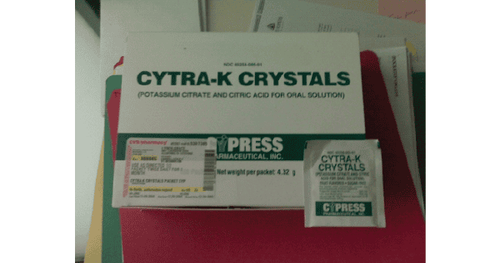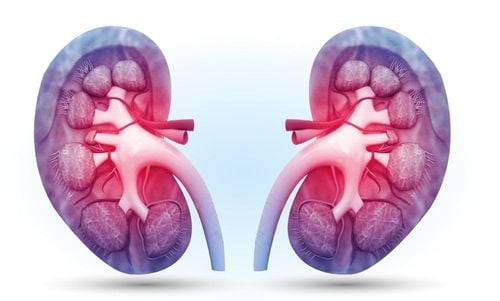This is an automatically translated article.
CYTRA-K is usually prescribed for patients at risk of gout, kidney stones or acidosis. The mechanism of action of the drug is to reduce the acidity in the urine, thereby helping the kidneys remove uric acid to prevent disease.
1. What is CYTRA-K?
CYTRA-K (also known as “Potassium Citrate/Citric acid”) is a medicine that reduces acidity in the urine, thereby helping the kidneys remove uric acid to prevent gout or kidney stones.
In addition, CYTRA-K can also be used to prevent and treat certain metabolic problems (such as acidosis) caused by kidney disease.
>>> Prevention of recurrence of kidney stones
2. How to use CYTRA-K
Take CYTRA-K by mouth as directed by your doctor, usually 4 times a day after meals and at bedtime. The recommended dose will be based on your medical condition and response to treatment.
To prevent diarrhea, you can take CYTRA-K pills after meals. To prevent stomach upset or upset stomach, mix the prescribed dose with cold water or juice as directed, then drink the entire mixture slowly.
The liquid form of CYTRA-K should be mixed with at least 120-240ml of water before use, be sure to shake the bottle well before each dose and measure carefully with a dedicated spoon. If you take this medicine as a powder, mix it with about 180ml of cool water or juice first, also chill the mixture to improve the taste of the medicine and make it easier to take.
To be safe, you need to take CYTRA-K exactly as prescribed, do not increase your dose or take it more often without your doctor's consent. Taking the right medicine and in the right dose will help maximize the effectiveness of the treatment.
While taking CYTRA-K, you may need to test the pH (acidity) of your urine with a special paper. The pH will help determine the right dose of the drug. Consult your doctor or pharmacist for more information.

Thuốc CYTRA-K thường được chỉ định cho những bệnh nhân có nguy cơ bị gút, sỏi thận hoặc nhiễm toan
3. Side effects of the drug CYTRA-K
Some possible side effects of CYTRA-K are: Nausea, vomiting, diarrhea and stomach pain. You can mix the medicine with water or juice, take it after meals, and drink more water to help prevent these side effects.
Tell your doctor right away if you notice any serious side effects after taking this medicine, such as: Severe stomach pain, tingling, numbness in your hands, feet, or weakness.
CYTRA-K can also cause rare but very serious side effects including: Fast/slow/irregular heartbeat, mood changes (e.g. confusion, restlessness), muscle spasms , convulsions, bloody or black, tarry stools, vomiting that looks like coffee grounds....These cases require immediate medical attention to get medical help.
4. Measures to prevent side effects of CYTRA-K
To prevent side effects from CYTRA-K, you need to:
Before taking CYTRA-K, tell your doctor if you are allergic to its ingredients or have any other allergic condition. ; CYTRA-K should not be used if you have certain health problems, especially conditions such as: Decreased adrenal gland function (Addison's disease), severe heart disease (heart attacks, heart damage) ), severe kidney disease (decreased or lost ability to make urine), low potassium diet, high potassium levels, severe dehydration; Tell your doctor about your medical history, especially of: Low blood calcium levels, heart problems (irregular heartbeat, heart failure), kidney disease, stomach/intestinal problems (stomach ulcers) duodenal ulcer, irritable bowel syndrome). Liquid CYTRA-K may contain sugar, so be careful if you have diabetes. To be on the safe side, ask your doctor how to use the product. During pregnancy, CYTRA-K should be used only when clearly needed. It is not known whether CYTRA-K passes into breast milk. Therefore, you need to discuss with your doctor the risks and benefits of the drug before taking it.
5. Drug interactions
Some products that may interact with CYTRA-K include: Aluminum-containing antacids, Aspirin, certain blood pressure medications (including ACE inhibitors such as Lisinopril, Angiotensin blockers such as Losartan), Drospirenone, Eplerenone, certain heart medications (such as Quinidine, Digoxin), Lithium, potassium supplements, some diuretics (such as Amiloride, Spironolactone, Triamterene).
If your doctor has directed you to take low-dose Aspirin to prevent a heart attack or stroke (usually at doses of 81-325 milligrams per day) it should be continued until further instructions are given.
6. Treatment in case of overdose and how to store
If you accidentally overdose on CYTRA-K and have serious symptoms such as unconsciousness, difficulty breathing, slow heart rate or muscle spasms, convulsions, call 911 immediately. If you miss a dose, take it as soon as you remember. If it is almost time for your next dose, skip the missed dose. Store CYTRA-K medicine away from moisture, light, out of reach of children and pets. In summary, patients need to take CYTRA-K exactly as prescribed by the doctor to effectively reduce the acidity in the urine and kidney diseases... While taking the drug, if you see any of the following symptoms. If there is a serious abnormality, it is necessary to notify the doctor immediately for timely treatment.
Please dial HOTLINE for more information or register for an appointment HERE. Download MyVinmec app to make appointments faster and to manage your bookings easily.
Reference source: Webmd.com












